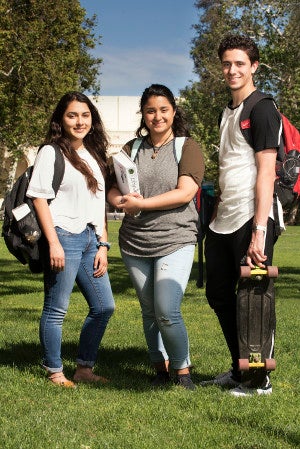LENS Dispatch
Making it Together
Renowned College Access Program Comes to CWRU
 PHOTO: Steven Dewall
PHOTO: Steven DewallStudents Joselyn Campoverde, Melissa Zavala and Motasem Salamah, came to Pomona College together from Chicago and know they can count on one another.
Joselyn Campoverde’s first year at Pomona College—a small, liberal arts school in Claremont, California— was more than challenging. “It was rough, definitely,” she recalled. She had “thoughts of transferring, like I didn’t really belong. Even though I had a very rigorous high school, I felt [the] impostor syndrome. In a lot of ways, I felt that this institution wasn’t really made for me.”
Part of what kept Campoverde on campus was having classmates from her home city of Chicago who also came to Pomona under a nationally acclaimed program providing college access and leadership development. And they were people with whom she could share doubts and receive encouragement.
Since 1989, The Posse Foundation has worked with leading colleges and universities to help select and prepare groups of promising students from major urban areas to attend their institutions. This August, Case Western Reserve University will welcome its first “posse” of undergraduates, a group of 10 students from New Orleans.
The program benefits both students and the schools that welcome them. At Pomona, which enrolled its first posse class in 2005, participants are leaders in student government and other student organizations, assistants in residence halls, peer mentors, fellows at the writing center, student activists and Fulbright award winners.
“The Posse students make a difference every day on campus,” Pomona’s dean of students, Miriam Feldblum, PhD, wrote in an email.
Part of the students’ success comes from the selection process, explained Posse founder and President Deborah Bial, EdD. The goal is to find exceptionally talented students whom traditional admissions processes might miss. It’s like selecting young people, Bial said, who could grow into U.S. senators or corporate CEOs. (In February, in fact, Shirley M. Collado, PhD, a member of the inaugural Posse class was named the next president of Ithaca College).
Another key to success is the cohort model, which includes a faculty mentor and support from Posse peers and staff. Bial created the national program after a student told her, “I never would have dropped out of college if I had my posse with me.”
Since then, more than 7,000 students— most from urban public schools—have become Posse Scholars and the program has a 90 percent graduation rate. Its reputation is so strong that President Barack Obama donated some of his 2010 Nobel Prize money to the organization.
Once a school has selected its cohort of students for the fall, the local Posse organization begins weekly gatherings of the group in January. The young people begin to get to know one another and also learn more about what to expect in college. When students arrive on campus, they work with faculty mentors, attend regular meetings and participate in retreats.
Now in her sophomore year at Pomona, Campoverde is another example of the model’s success. One sunny day in January, with snow on the nearby mountains, she sat on the Pomona campus quad with two members of her posse, Melissa Zavala and Motasem Salamah.
Zavala recalled walking out of a school meeting about medical-school requirements feeling overwhelmed and discouraged. “That really bummed me out: I had this whole mental and emotional crisis,” she recollected, as she imagined her dream crumbling. “But that day happened to be a Posse meeting. All my Posse were there immediately. ‘No, you’re gonna do it!’ It was a big boost of confidence.”
The three and other Posse members still see each other often and go on a weekly expedition for chicken wings. Even if they don’t get together every day, they know they can count on one another. Zavala reached for the right metaphor. “We all became like a big…” Salamah completed her sentence. “…family.”





